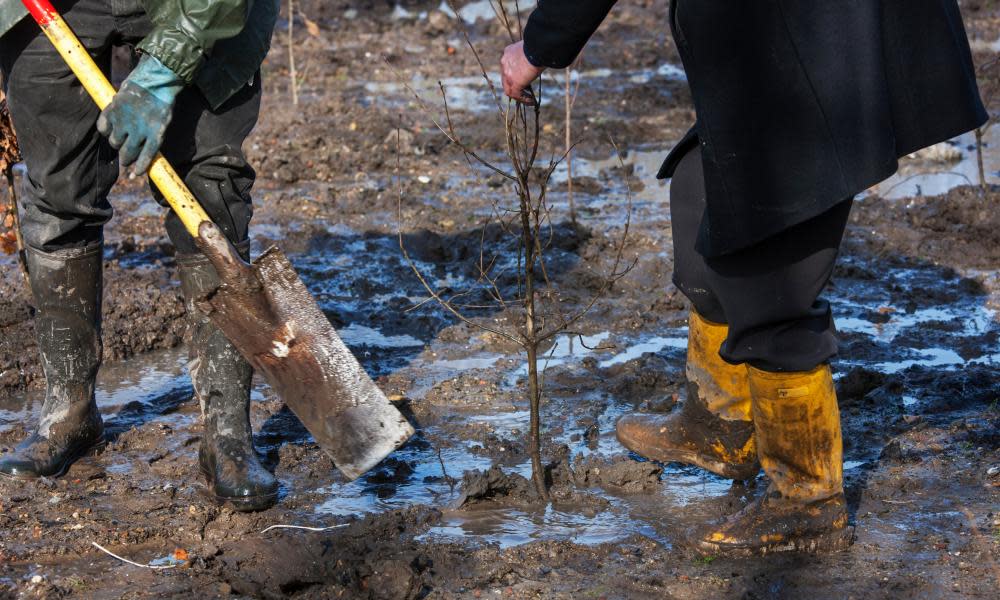Treasury's 'green recovery' not enough, say campaigners

Environmental groups have reacted with disappointment to details of the government’s Covid-19 economic rescue package released by the Treasury.
On Monday night the government announced some details of the announcement expected on Wednesday, including a £1bn energy efficiency upgrade for public buildings and insulation for some social tenants, who could save up to £200 a year on their energy bills as a result. A Green Jobs Challenge fund will provide £40m for green charities working on improving England’s landscapes, with the money to be spent on projects such as tree-planting and cleaning up rivers. A further £50m will go to innovative approaches to reducing greenhouse gas emissions from social housing.
In all, at least £3bn will be made available for greening the recovery, according to the Treasury, which the government said would “support tens of thousands of green jobs”, as well as reducing the UK’s carbon dioxide emissions and helping to “build back greener”.
But the big question for environmental campaigners was: is that it?
“Surely this is just a downpayment?” asked Rosie Rogers, head of green recovery at Greenpeace UK. She pointed to the German government’s £36bn investment in measures to boost the economy while cutting emissions, with France spending £13.5bn to the same end. If the total green element of the economic rescue package ends up at £3bn, that would be “not playing in the same league”, she said.
Ed Matthew, associate director of the E3G environmental thinktank, said £18bn was needed in the next 10 years to make all buildings energy efficient and get the UK on track to meet its net zero emissions target by 2050. “The funding announced today is a decent start only if it is a downpayment on a much larger, more ambitious investment programme,” he said.
The Treasury declined to provide a detailed breakdown of the spending before the chancellor, Rishi Sunak, delivers his full summer economic update on Wednesday. A spokesperson told the Guardian: “The government remains committed to decarbonising buildings to keep us on track to reach net zero emissions by 2050. The funding expected to be announced this week represents a significant and accelerated downpayment on decarbonising buildings, to help stimulate the economic recovery and create green jobs. Allocations for future funding will be determined in due course.”
Related: Invest in the green economy and we'll recover from the Covid-19 crisis | Joseph Stiglitz
Energy efficiency for the UK’s homes – the draughtiest in Europe – is essential to cutting Britain’s greenhouse gas emissions, as home heating accounts for about a fifth of the UK’s carbon output. Warmer homes for social tenants could lower annual energy bills by £200 for some of the poorest households, the government estimates. Retrofitting homes with better insulation, higher standard glazing and doors, and other relatively straightforward measures would also create large numbers of jobs – hundreds of thousands of jobs, potentially, by some estimates.
In the Conservative election manifesto last December, there was a promise to devote at least £9.2bn to energy efficiency programmes in this parliament. A wide range of economic experts, including the government’s own advisers, the Committee on Climate Change, have also urged a focus on insulating homes.
Yet the government appears to have doubts. Previous attempts at nationwide insulation programmes over the past two decades were often piecemeal, or relied on incentives such as putative bill savings that were not enough to persuade people to undergo the renovation required. The last attempt, the Green Deal, sputtered out soon after the coalition did in 2015, and there has been no central government programme on home insulation since then.
Green campaigners are waiting to see whether the chancellor will unveil spending closer to the government’s £9.2bn manifesto commitment when he delivers his update on Wednesday. If much greater ambition is not forthcoming, they are likely to brand the government’s attempts at a green recovery a failure.
Katie White, executive director of advocacy and campaigns at WWF, said its research had shown £90bn of benefits to the UK economy from investing in a green recovery. “But a recovery where we ignore climate and nature is not a recovery at all – it is starting the timer for the next crisis. All eyes will be on the chancellor’s speech to see if ambitions will truly meet the future challenges we face,” she said.


